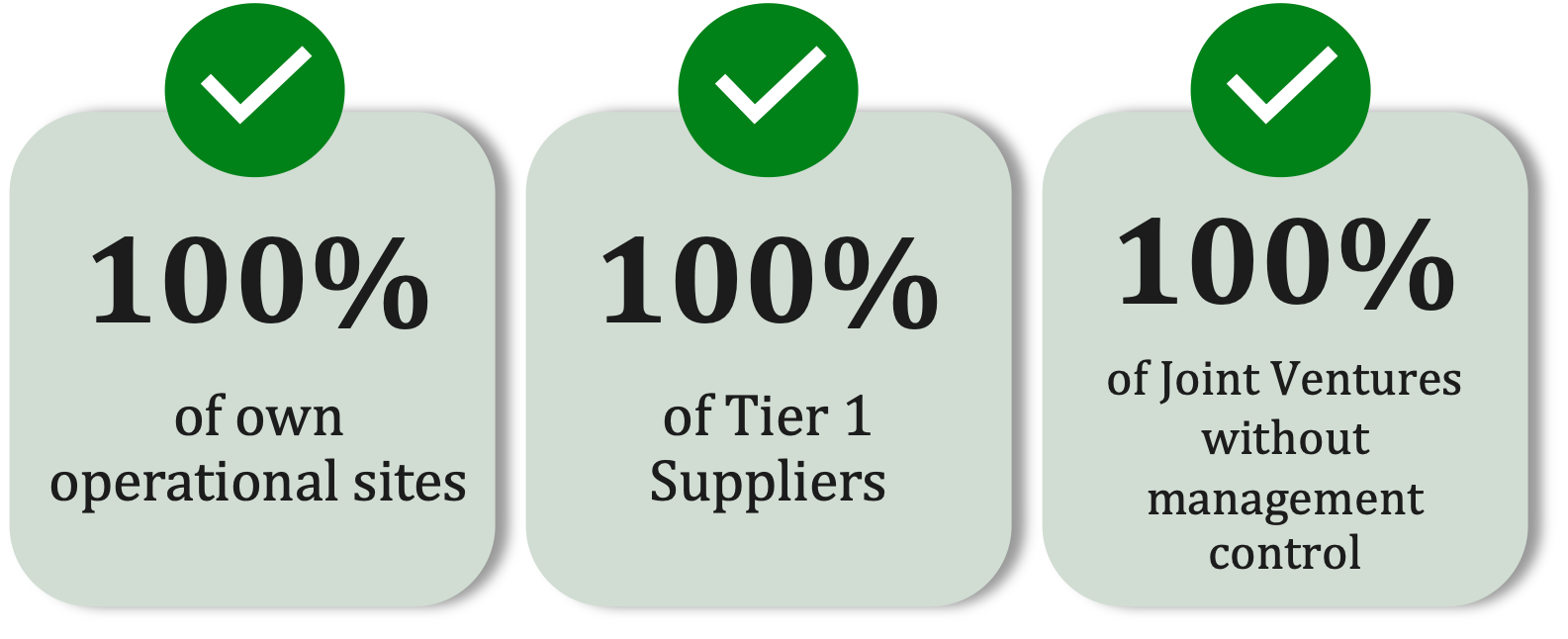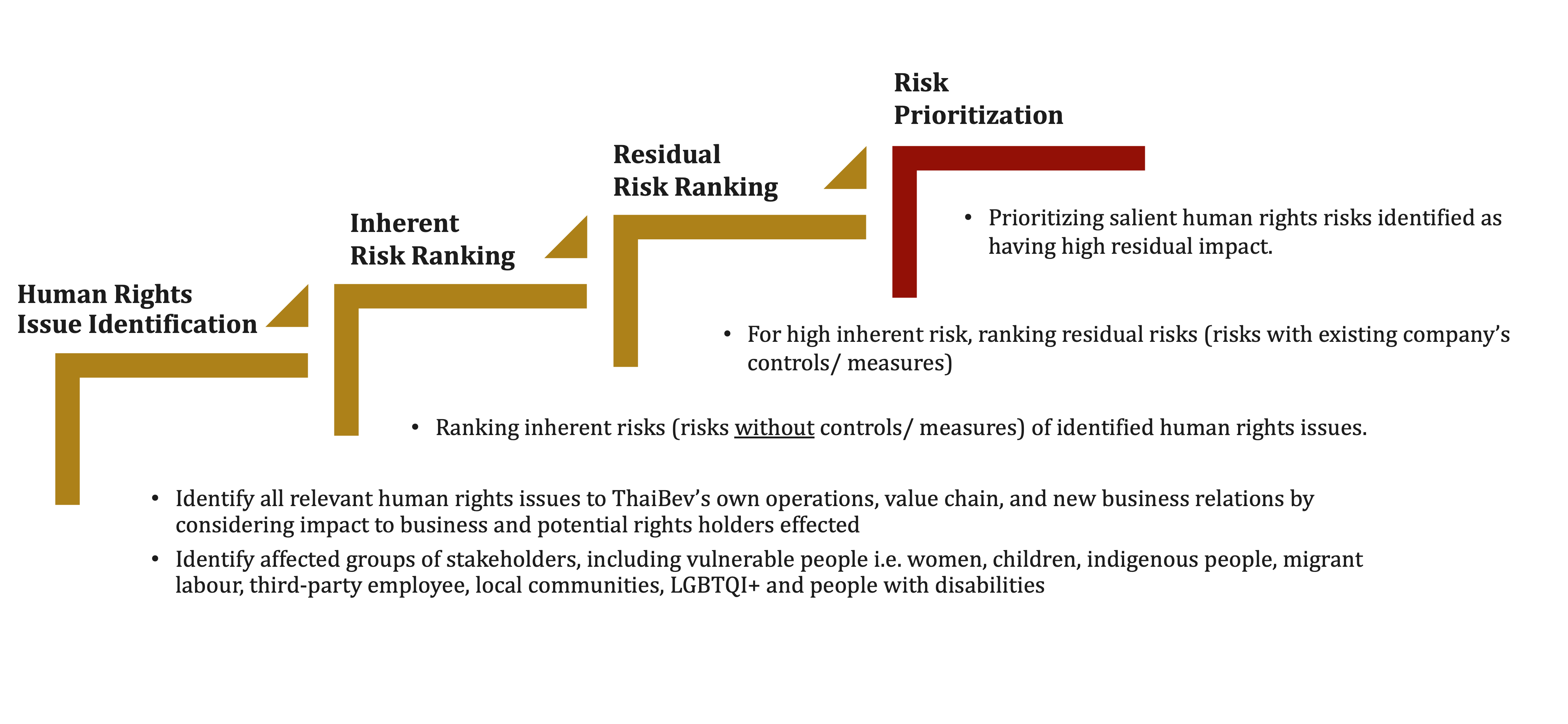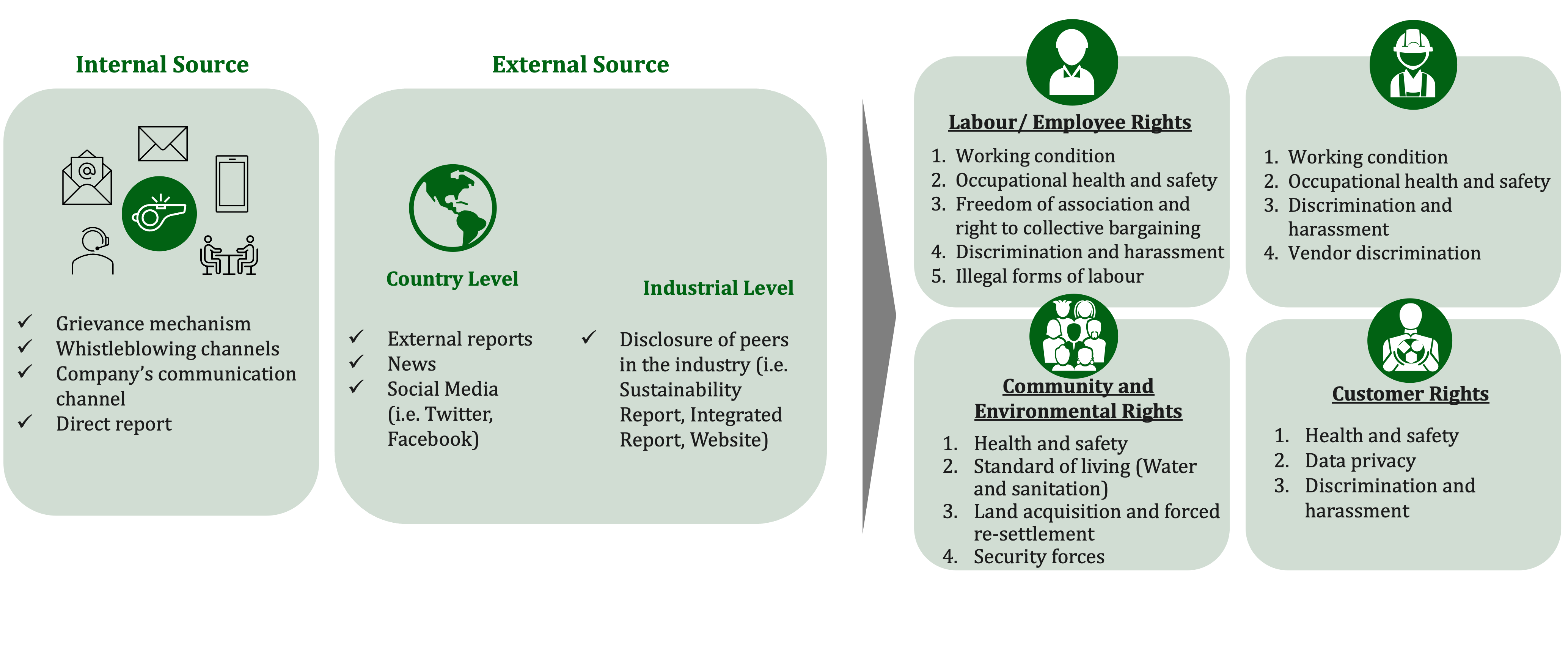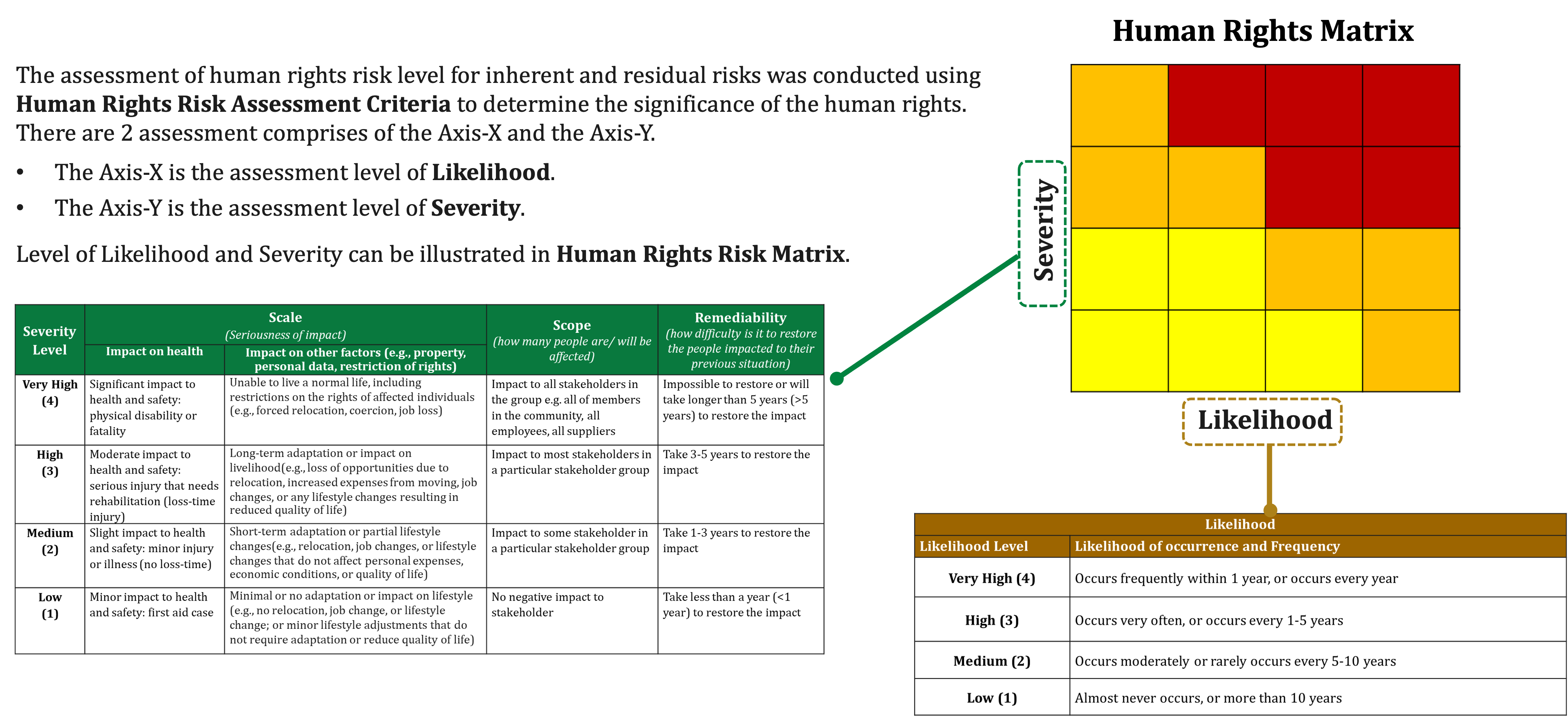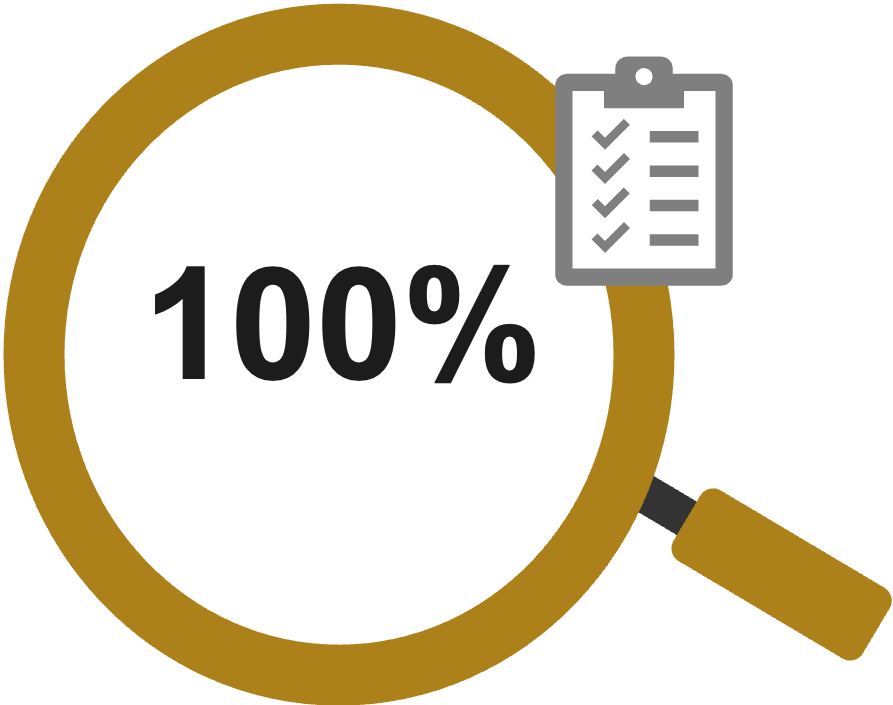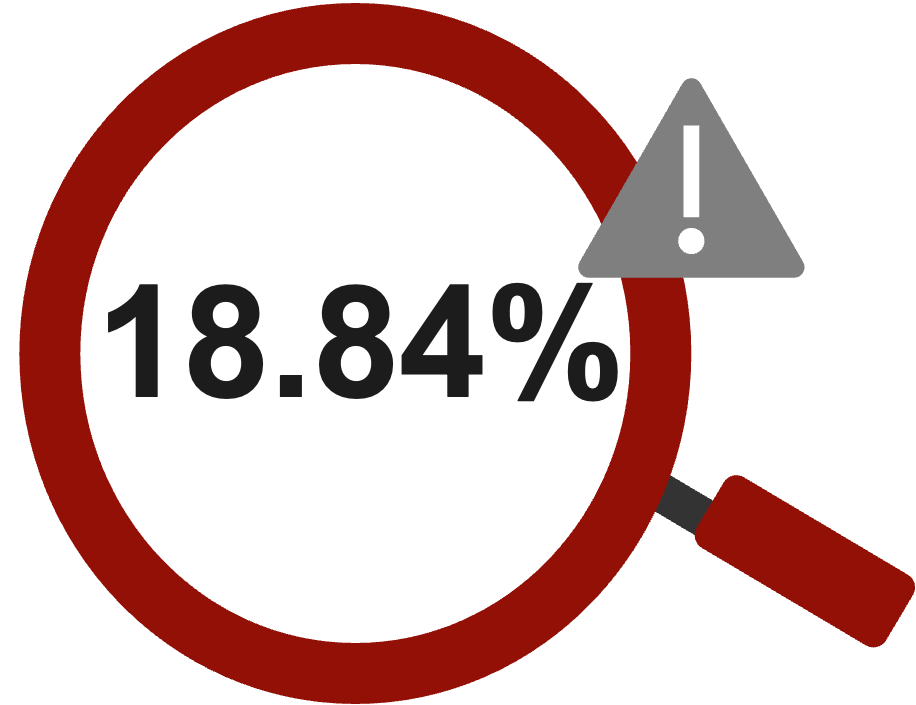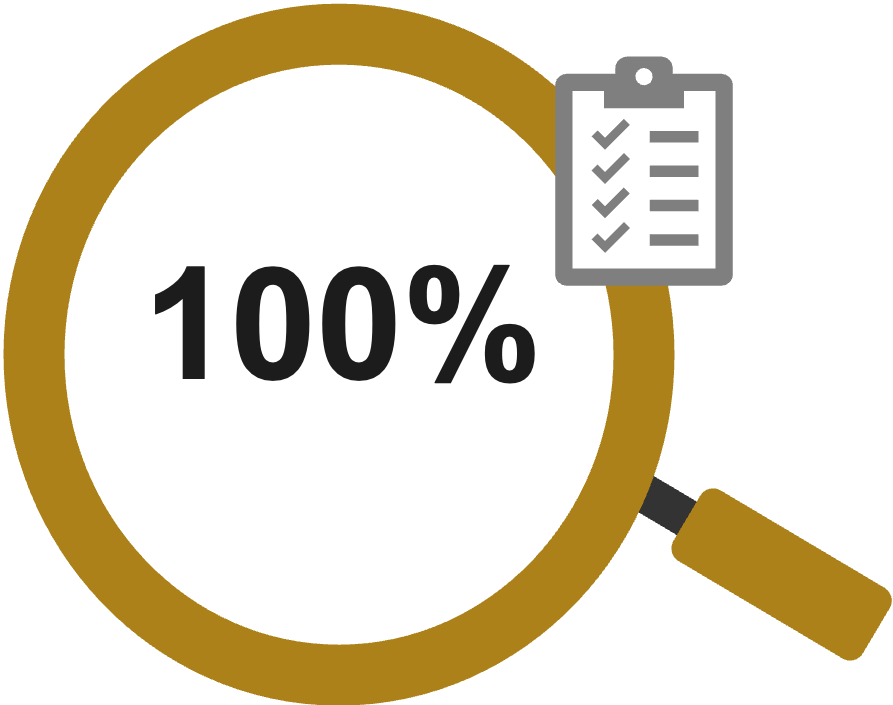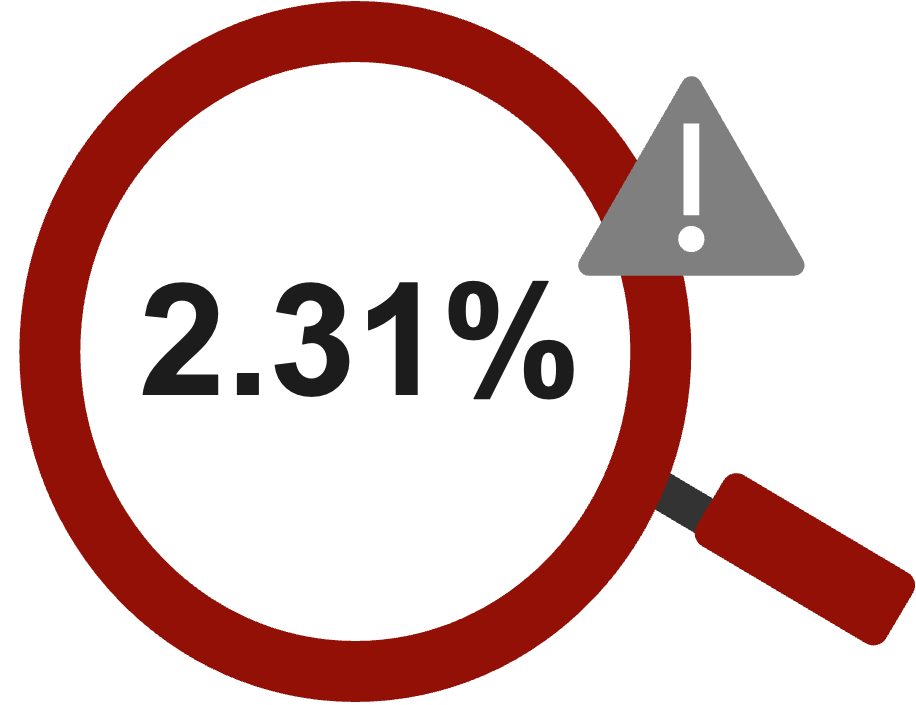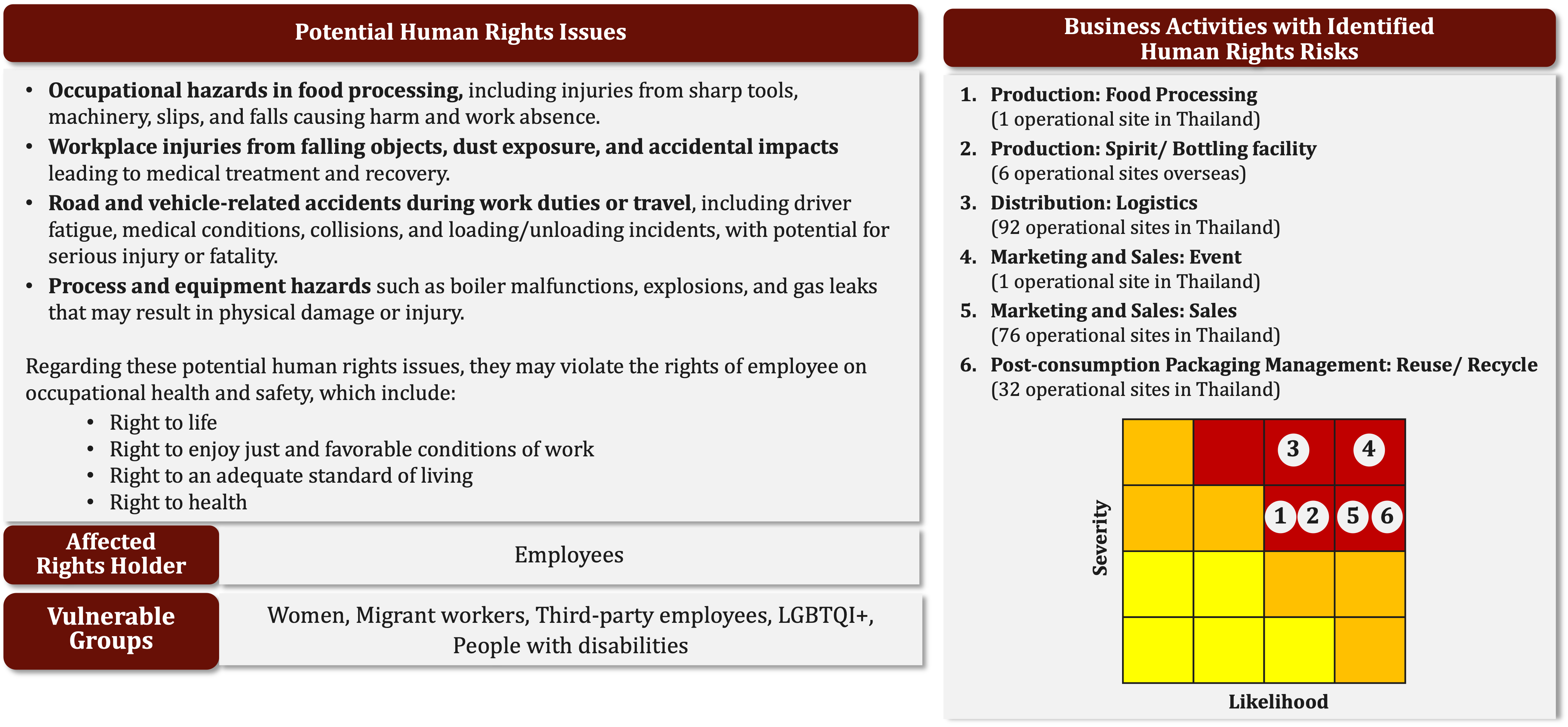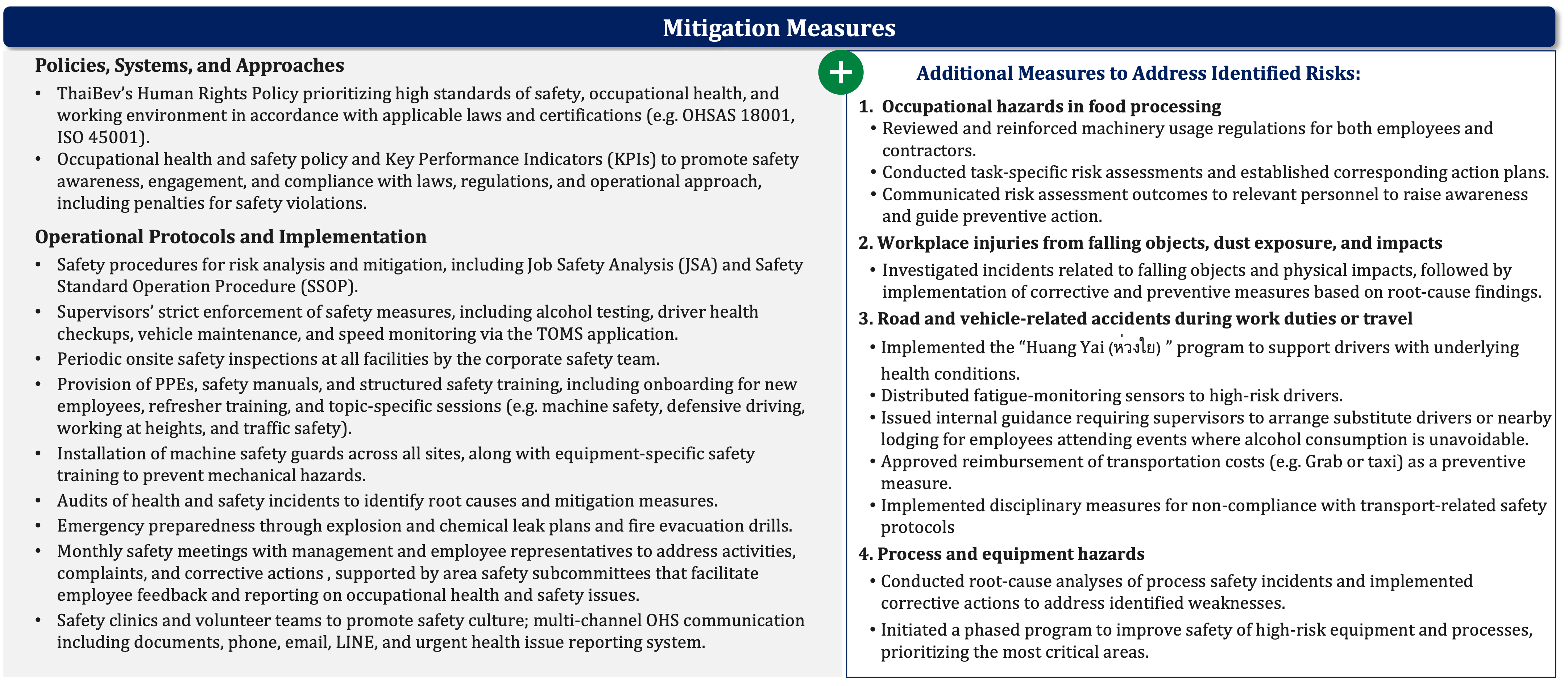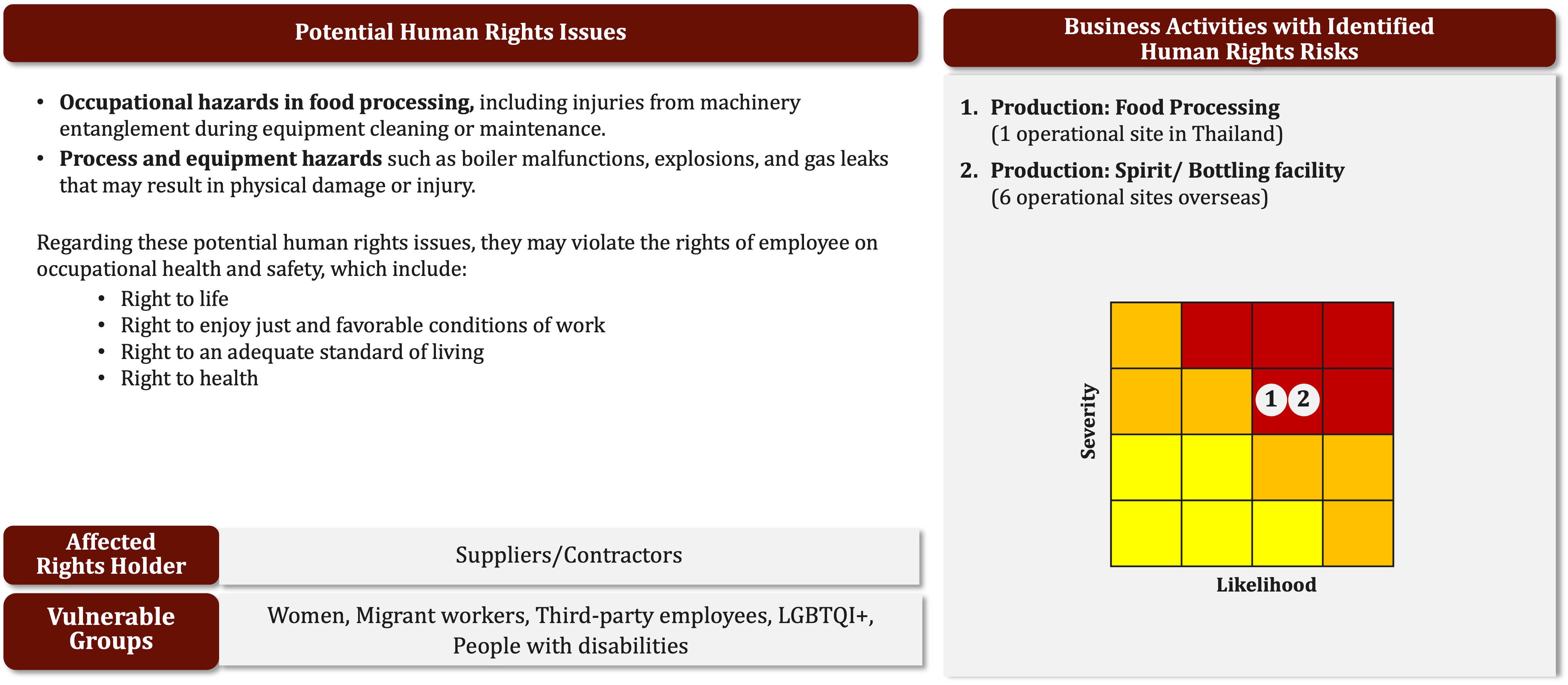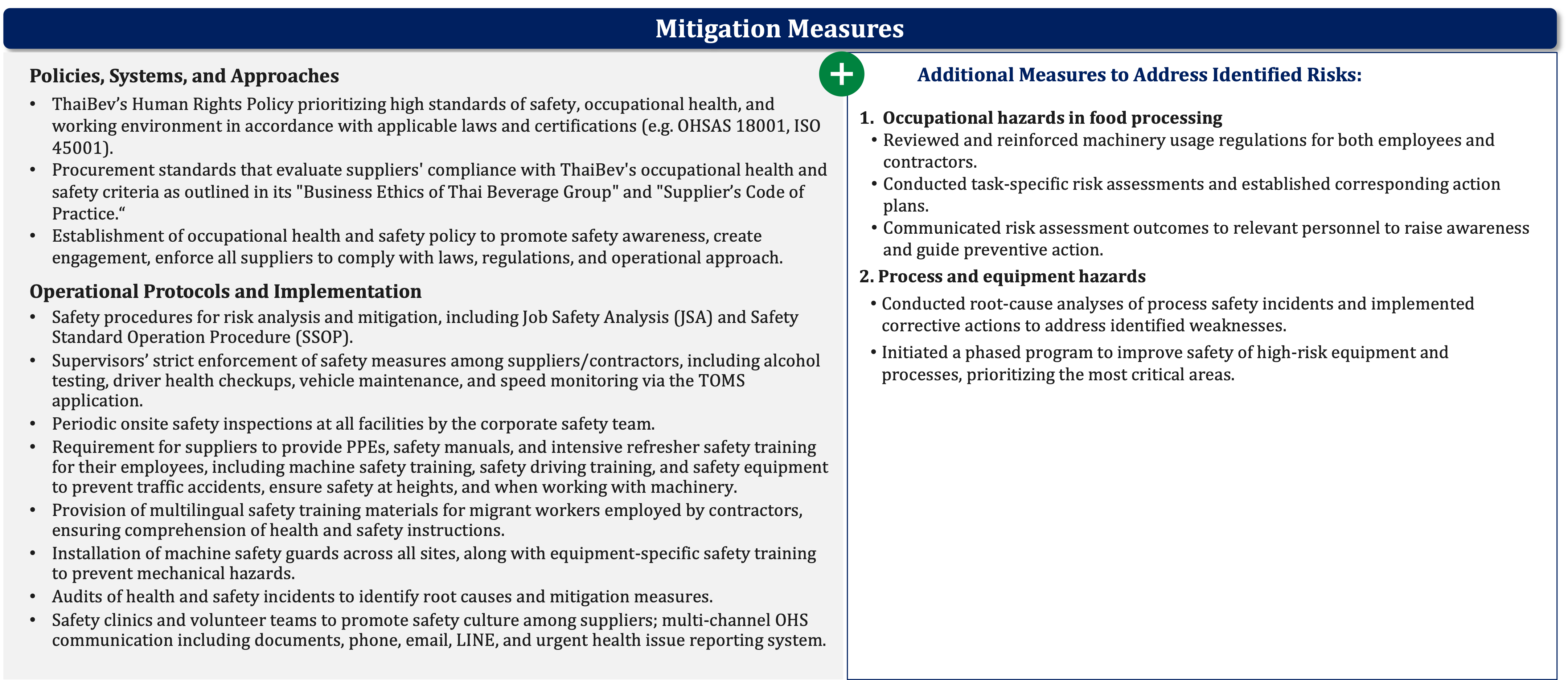- 100% of ThaiBev operational sites (total of 1,104 sites) were assessed human rights risk and impact. ThaiBev operational sites consist of subsidiaries and joint ventures (with management control).
- 18.84% of ThaiBev's operational sites (208 out of 1,104) have been identified as having high human rights risks (salient issues). This year, the two salient human rights issues identified were employee occupational health and safety, and supplier/contractor occupational health and safety, with no additional issues.
- Mitigation measures and remediation processes have been implemented at 100% of ThaiBev's operational sites (208 out of 208) identified with high human rights risks. Additionally, the company maintains mitigation measures and continuously monitors for potential risks to prevent human rights violations across all operational sites
- 100% of ThaiBev joint ventures (total of 10 joint ventures) were assessed human rights risk and impact
- 0% of ThaiBev’s joint ventures (0 out of 10) have been identified as having high human rights risks or salient human rights issues; therefore, no mitigation actions were required.
- However, the company has established mitigation measures and continues to monitor risks to prevent potential human rights violations across all joint ventures.
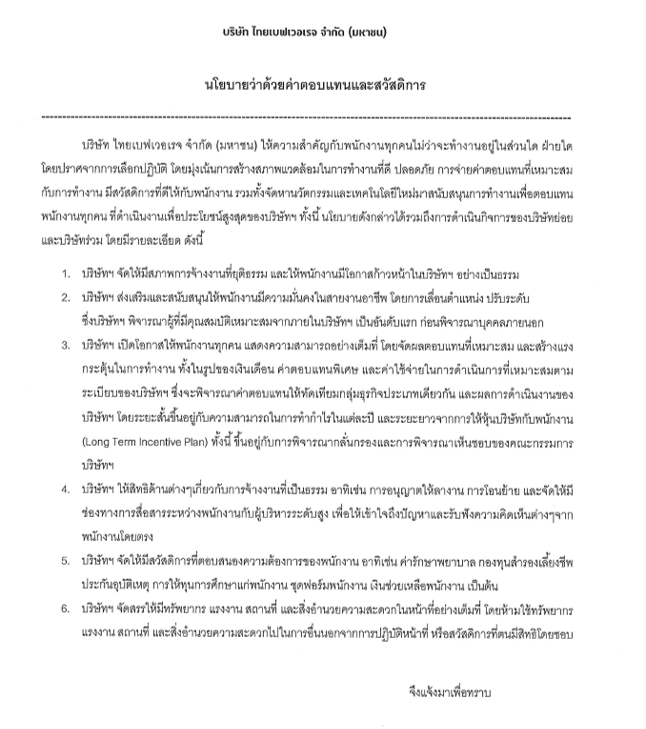
Click For Employee Rulebook
<Translation of
of Remuneration and Benefits Policy>
The company places great importance on every employee, regardless of their role, and is committed to fostering a non-discriminatory working environment. We focus on creating a safe and positive workplace, offering fair compensation that reflects the nature of the work, and providing comprehensive employee benefits. In addition, we continuously invest in new innovations and technologies to support our employees’ work, as a way to recognize their contributions toward the company’s success. This policy also extends to the operations of our subsidiaries and affiliates. The key details are as follows:
- The company ensures fair employment conditions and offers equal opportunities for career advancement within the organization.
- The company promotes and supports job security by offering promotions and position advancements. Priority is given to internal candidates who meet the required qualifications before considering external applicants.
- The company encourages all employees to reach their full potential by offering fair compensation and performance-based incentives. This includes salaries, bonuses, and appropriate operational expenses in accordance with company regulations. Compensation is benchmarked against industry standards and the company’s performance. In the short term, compensation is linked to annual profitability, while in the long term, employees may be rewarded through company stock (Long-Term Incentive Plan), subject to review and approval by the company’s Board of Directors.
- The company ensures fair employment rights, including leave entitlements, transfers, and open communication channels between employees and senior management. These channels aim to foster understanding of employee concerns and allow direct feedback from employees to management.
- The company provides a range of employee benefits designed to meet the diverse needs of its workforce. These include medical expenses, a provident fund, accident insurance, educational support for employees, uniforms, and various forms of employee assistance.
- The company allocates necessary resources, labor, workplace facilities, and tools to support employees in performing their duties efficiently. These resources must be used strictly for work-related purposes or for welfare entitlements as permitted, and not for any unrelated or unauthorized use.
<Translation of
Employee Rulebook, Section 4, item 1, and Section 2>
Section 4: Overtime and Holiday Work Compensation Principles
- If the nature of the work requires continuous operation (where stopping would cause damage), is emergency work, or falls under other categories specified by ministerial regulations, the company may require employees to work overtime and/or on holidays as necessary. Employee consent isn't required for this, provided the total combined overtime or excessive working hours don't exceed 36 hours per week.
Section 2: Normal Working Hours
- Head Office and other Offices: Monday-Friday (7.5 hours/day)
- Factories: Monday-Saturday (8 hours/day)
ThaiBev strives to cultivate an environment where everyone has equal opportunities to thrive and succeed, and firmly prohibits discrimination of any kind. ThaiBev recognizes that a diverse and inclusive workforce is crucial to our success. This includes initiative that creates a way for boosting work-life balance.
The majority of our workforce is employed across the value chain—particularly in production, sales, supply chain and warehouse functions. These roles tend to be male-dominated due to the physical and operational requirements inherent to the industry. As a result, the overall number of male employees and the cumulative annual compensation base for male employees are higher than those for female employees.
Nevertheless, ThaiBev is committed to ensuring equitable compensation practices for all employees, regardless of gender. Our salary and wage management policies are guided by principles of fairness and competitiveness. Compensation is determined based on job level, role and responsibilities, relevant experience, and educational background. The structure is aligned with internal grading systems and benchmarked against comparable positions in the external labor market to ensure fairness and competitiveness.
Annual salary increases are determined through a merit-based process approved by the Chief Executive Officer. Performance evaluations from the prior year are the key criteria in determining adjustments. This process helps maintain equity, transparency, and consistency across the organization.
3 Components form foundation of HC Management, Job grade structure is group of positions within a range of job value, which reflects expected role and responsibility of employee at a particular grade/level
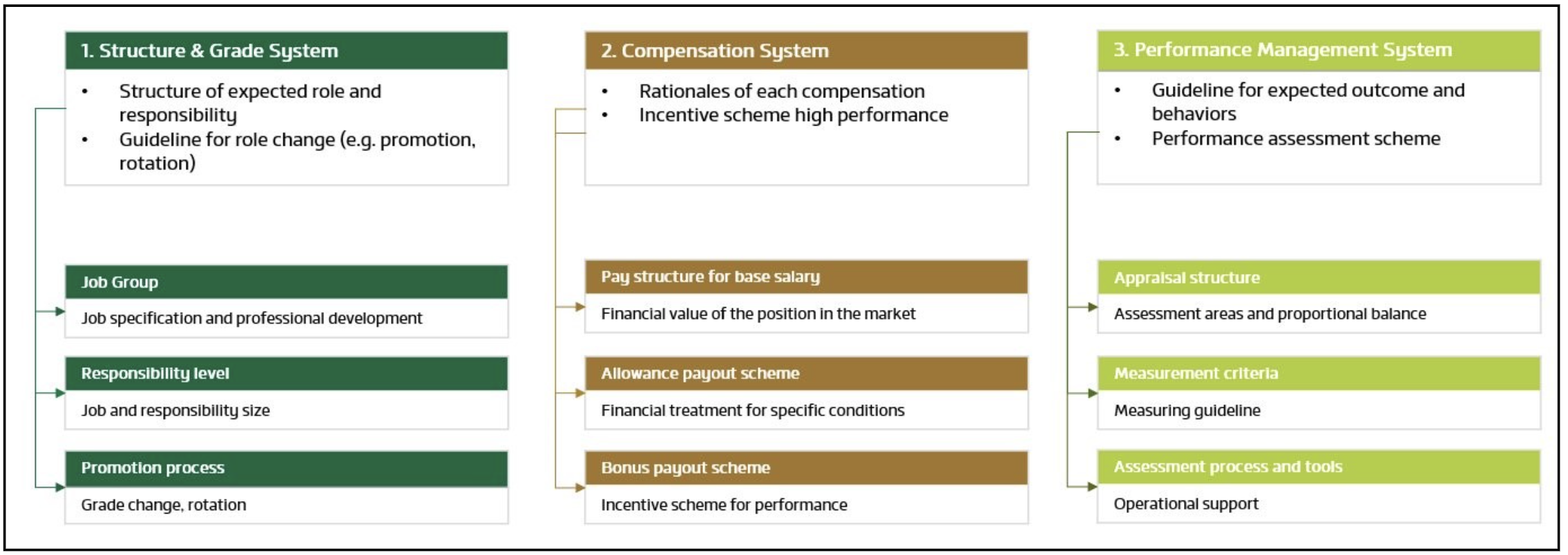
<Translation of Employee Rulebook, Section 3, item 3.1>
Section 3: Holidays, Leave, and Principles for Taking Leave
Clause 3 - Annual Leave
Item 3.1 Employees are entitled to annual vacation
with pay, determined by their job level and years of service, as follows:
3.1.1 First Year of Employment: Employees who have passed probation and been appointed as permanent staff are entitled to annual vacation leave proportionate to the rights outlined in Clause 3.1.2. The leave days will be calculated based on the actual length of service from the start date until the end of the accounting year (fractions of a day are rounded down).
3.1.2 Annual Leave Entitlement based on Job Level and Years of Service:
-
Levels 1-9:
- Less than 5 years of service: 6 working days
- 5 years of service or more: 8 working days
-
Levels 10-12:
- Less than 5 years of service: 8 working days
- 5 years of service or more: 10 working days
-
Levels 13 and above:
- Less than 5 years of service: 10 working days
- 5 years of service or more: 12 working days
<Translation of Employee Rulebook, Section 8, item 3.1>
Section 8: Termination of Employment
Clause 3: Special Severance Pay
3.1 The Company will pay special severance pay in accordance with the law to employees whose employment is terminated due to restructuring of the organization, production processes, sales, or services resulting from the introduction or alteration of machinery or technology, which necessitates a reduction in the number of employees. The Company will notify the labor inspector and the affected employees of the termination date, the reason for termination, and their names at least sixty days prior to the termination date.
Should the Company fail to provide the aforementioned advance notice, or provide less notice than stipulated, the Company will pay special severance pay in lieu of notice. This amount will be equivalent to sixty days of the employee's last wage rate, or the wages for the last sixty days of work for employees paid on a piece-rate basis.
In cases where special severance pay in lieu of notice has been paid, it shall also be considered as payment in lieu of notice under the Civil and Commercial Code.
ThaiBev ensures adequate wages by regularly reviewing compensation structures and comparing them to national and regional cost-of-living indices and industry benchmarks. We engage adjust salaries accordingly to ensure that all staff can maintain a decent standard of living. This is part of our commitment to employee well-being and sustainable development.
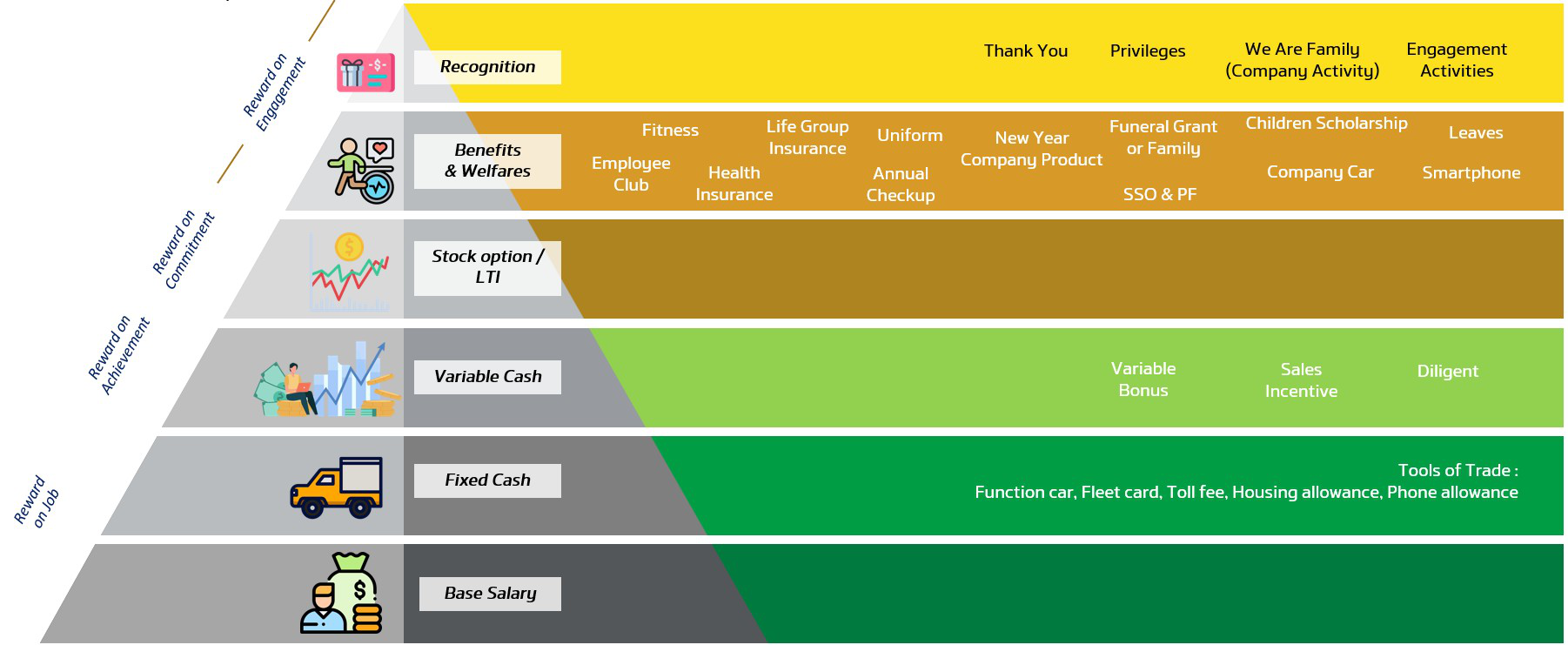
Example of other allowances are payments provided to employees in addition to their basic salary, designed to help cover employment-related costs based on their job.
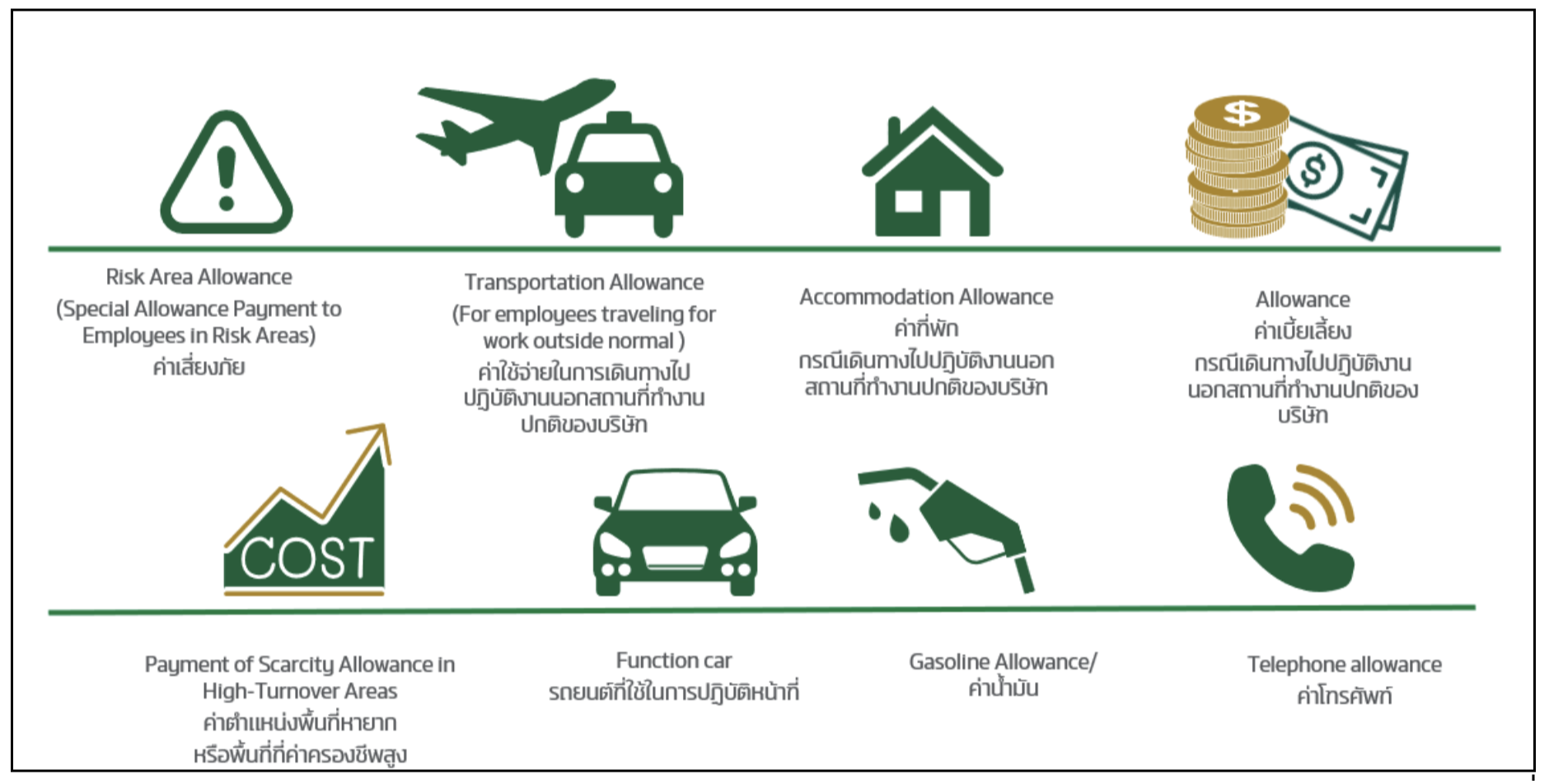
ThaiBev committed to promoting employee well-being by avoiding or reducing overtime and excessive working hours. We have implemented internal policies that set clear maximum working hours in compliance with labor laws, encourage work planning and time management, and monitor working hours regularly through the "
Time Management System". Managers are trained to distribute workloads effectively, and employees are encouraged to raise concerns when workloads become unmanageable. These efforts support a healthy work-life balance and sustainable productivity. Recognizing the importance of work-life balance, the company has consistently valued a harmonious work-life integration such as 12 employee clubs, catering to diverse interests, namely football, badminton, running, cycling, tennis, golf, bowling, off-roading, healthcare, photography, music, and ASEAN. Fostering a supportive work environment that prioritizes the physical and emotional well-being of its employees.
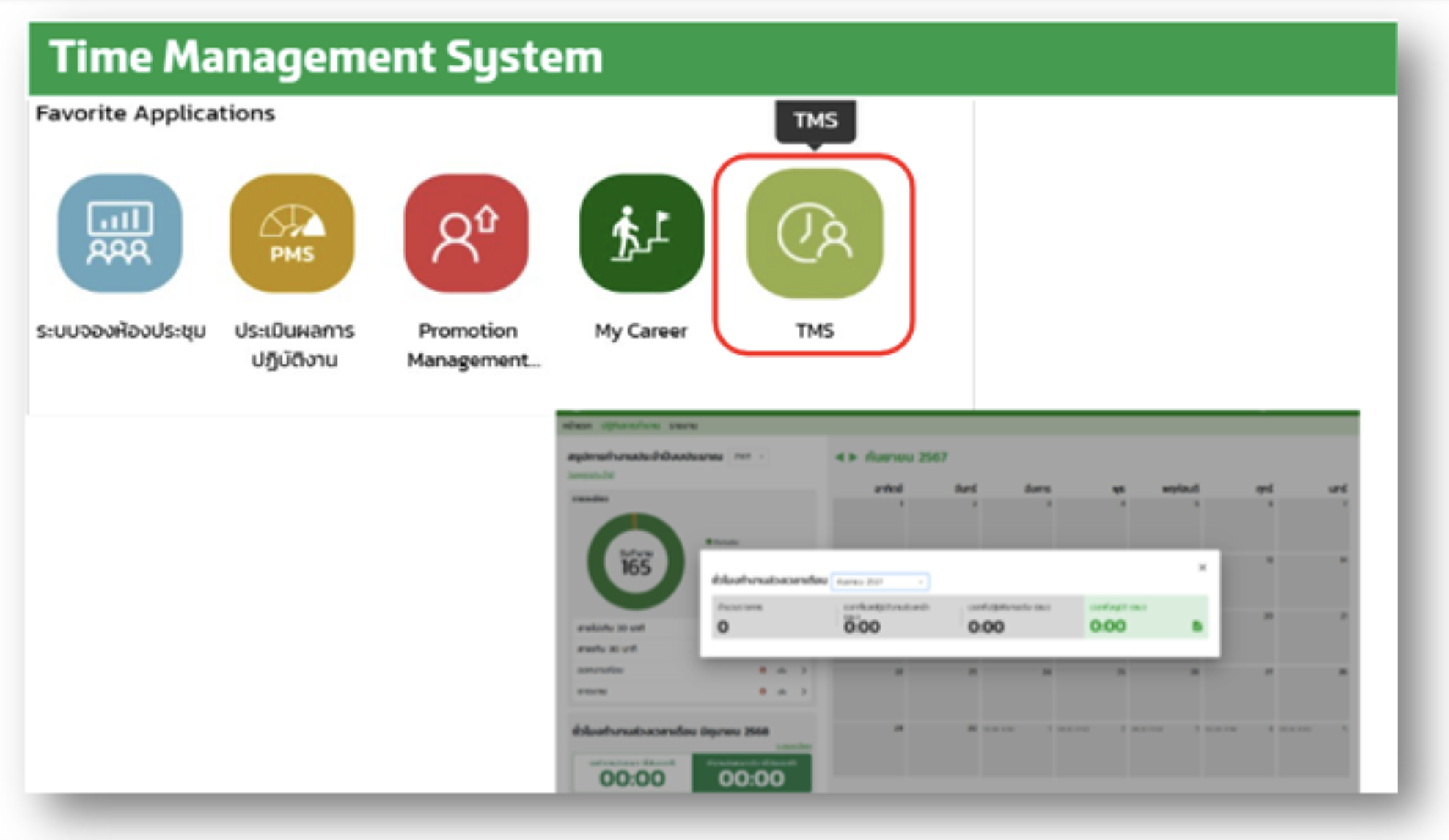
The company has established clear policies to set maximum working hours in line with labor laws. Regular working hours do not exceed 8 hours per day or 48 hours per week, with overtime strictly controlled and subject to approval from line manager in Time Management System. The purpose of this policy is to ensure employee well-being, prevent fatigue, and promote a healthy work-life balance.
<Translation of Employee Rulebook, Section 4>
Section 4: Overtime and Holiday Work Compensation Principles
- If the nature of the work requires continuous operation (where stopping would cause damage), is emergency work, or falls under other categories specified by ministerial regulations, the company may require employees to work overtime and/or on holidays as necessary. Employee consent isn't required for this, provided the total combined hours don't exceed 36 hours per week.
- Employees ordered by their supervisor to work overtime or on holidays will receive overtime pay and holiday pay according to the following criteria:
- 2.1 Employees working overtime on a normal working day will receive one-and-a-half times their normal hourly wage rate for the hours worked. If working overtime on a holiday, they will receive three times their normal hourly wage rate for the actual hours worked. If overtime work immediately follows normal working hours for at least 2 hours, employees must be given a break of at least 20 minutes before continuing overtime. This break can be waived if the work's nature requires continuous operation with the employee's consent, or if it's emergency work.
- 2.2 Employees working on a holiday who already receive wages for holidays will receive an additional one times their normal working day wage rate for the hours worked. Employees working on a holiday who do not receive wages for holidays will receive two times their normal working day wage rate for the hours worked on the holiday.
ThaiBev is committed to the principles of fairness and equality by determining compensation and evaluating job value based on the nature of the work and employee performance. This approach ensures that all employees are fairly rewarded in alignment with their skills, capabilities, and contributions, while also fostering a workplace culture driven by performance and embracing diversity and inclusions as following
- Recruitment and Selection, ThaiBev focuses on the qualifications, competencies, and suitability of candidates, regardless of gender, to promote equality and provide fair opportunities for all.
- Job Evaluation involves analyzing and assessing the value of each job position by considering various factors such as responsibilities, job complexity, required skills, and the overall impact of the job. This helps appropriately rank the importance of different positions.
- Compensation management refers to determining salaries or rewards that correspond to the job’s value and align with the labor market, while also taking into account employee performance, abilities, and experience. This process aims to motivate employees and maintain fairness within the organization.
Both processes are important tools for promoting transparency, equality, and sustainable employee development.

To align with its principles of
sustainability and social responsibility, ThaiBev actively monitors the
gender pay gap as part of its commitment to
equal remuneration. We achieve this by systematically collecting and analyzing compensation data, which helps us ensure accountability and drive continuous improvement.
We implement various corrective measures to close any identified gaps, including:
- Conducting regular pay equity audits (for independent assurance, please refer to the LRQA Independent Assurance Statement, PDF page 1, "Terms of engagement" section, 3rd bullet point – "GRI 405-2 Ratio of basic salary and remuneration of women to men").
- Revising compensation policies.
- Promoting inclusive talent development programs.
- Provident Fund
- Medical Welfare
- Social Security
- Employees’ Children’s Scholarships
- Retirement Benefits
- Loan for Disaster Relief
- Company Medical Room
- Mobile Mammography
- Happy Relax (massage by visually impaired people)
- Day Care for ThaiBev Kids
- Employee Education Scholarships
- Mobile Dental Services
- Employee Shuttle Service
- Influenza Vaccine
- Corporate Hotel Benefits
- Annual Health Check
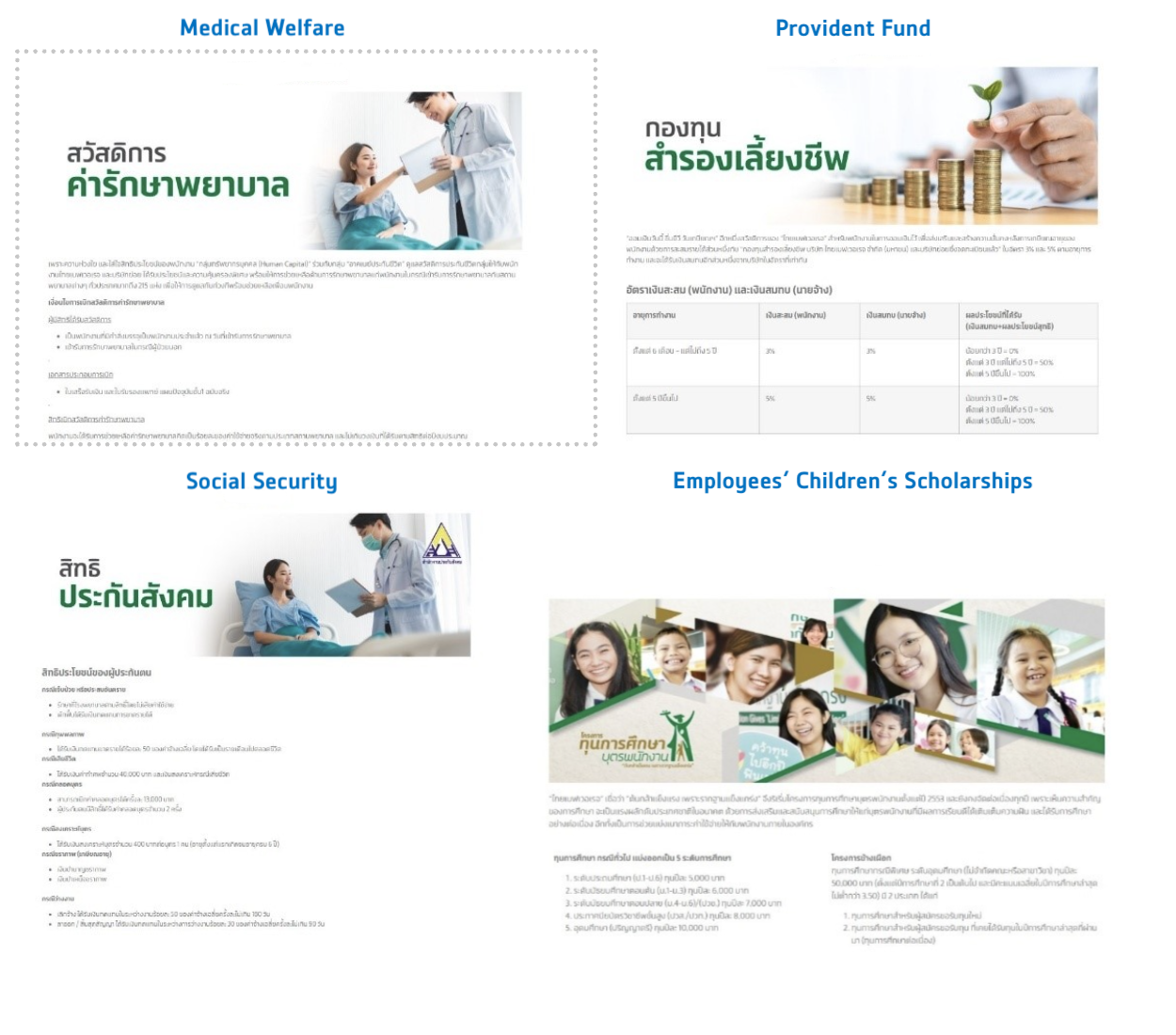
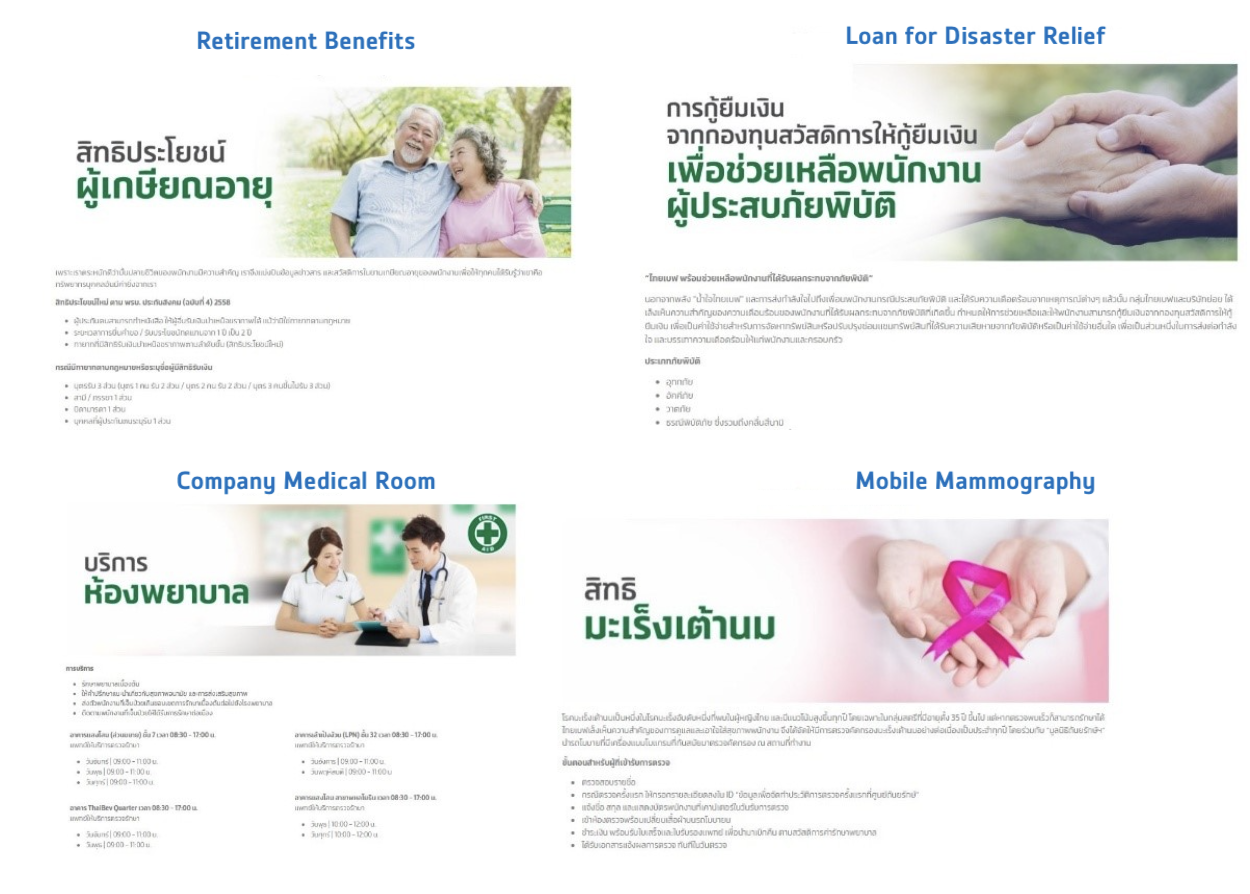
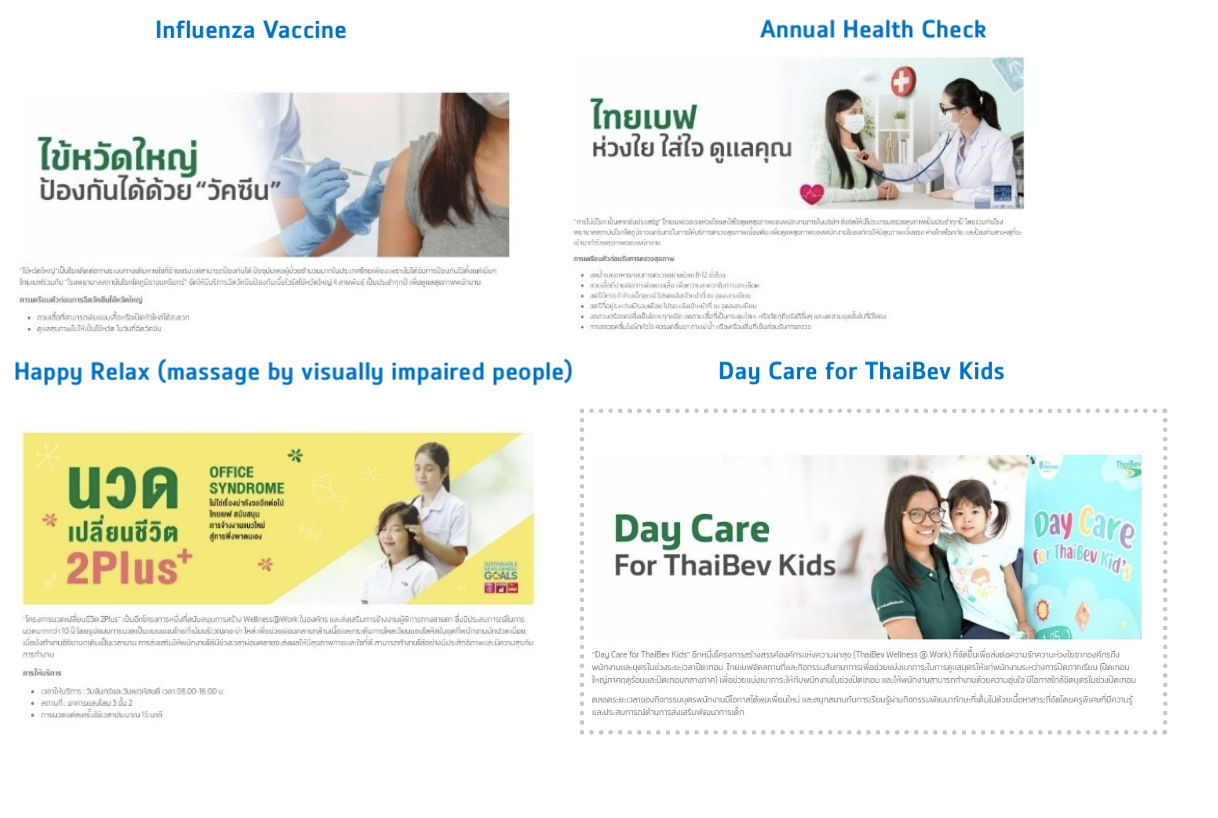
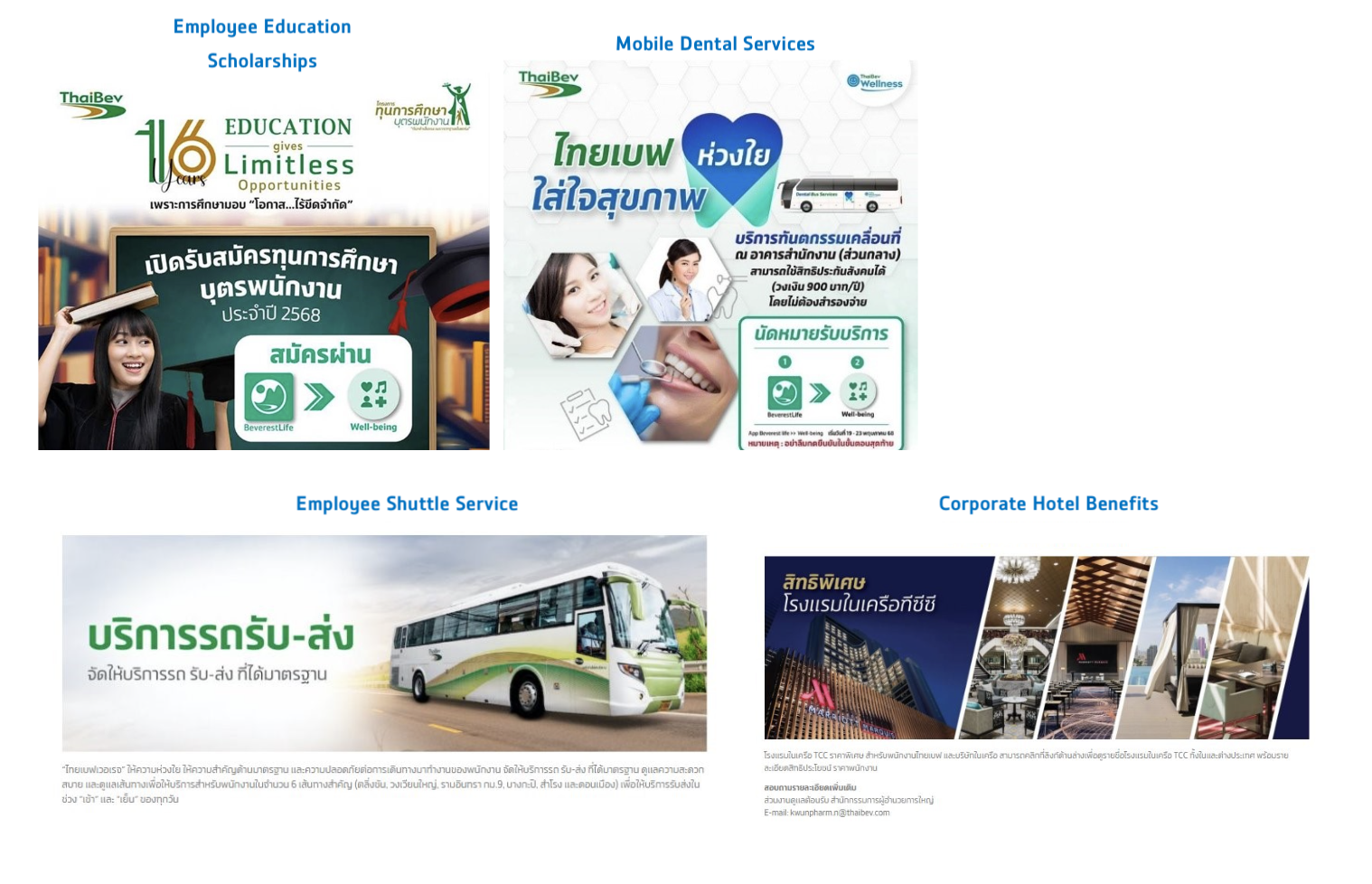
ThaiBev ensures employees utilize their annual leave entitlements by requiring them to submit annual leave forms at the beginning of each year. This proactive approach allows the company to plan its continuous operations effectively.
Furthermore, Section 3, Item 3.2 of the
Employee Rulebook stipulates that employees wishing to take annual vacation must submit a leave request to their supervisor at least three working days in advance. Written approval from the supervisor is mandatory before leave can be taken.
In instances of business necessity, the company reserves the right to pre-determine employees' annual vacation dates.
Example of courses
- Awareness Building for Energy Conservation
- Sustainability Course (Understanding ESG or GHG Reduction Management)
- Sustainable Green Concept: Aiming for Zero Waste to Landfill (Philosophy for reducing waste to landfills)
- Greenhouse Gas Reduction with Employee Participation
- Awareness Building for Energy Conservation
- Product Carbon Footprint (CFP) Assessment
- Basic Knowledge of Green Industry
- Green Industry Related Laws and Regulations

Women in
The total workforce
Target
42%
By 2030

Women in
All Management Positions
(as% of all management workforce)
Target
45%
By 2030

Women in
Junior Management Positions
(as% of all junior management workforce)
Target
50%
By 2030

Women in
Top Management Positions
(as% of all senior management workforce)
Target
40%
By 2030

All management positions Women in
Revenue-Generating Positions
(as% of all management in Revenue-Generating Positions)
Target
50%
By 2030

Women in
Stem-Related Positions
(as% of all management in Stem-Related Positions)
Target
50%
By 2030

Thai |
84.94 |
60.42 |

British |
0.66 |
2.65
|

Burmese |
3.83 |
16.15 |

Vietnamese |
5.22 |
4.57 |
| Other Asian Nationality |
5.30 |
15.75 |
| Other Non-Asian Nationality |
0.05 |
0.47 |
Remark:
Other Asian Nationality includes Cambodian, Chinese, Malaysian, Singaporean, Hong Kong, Filipino, Indonesian and Nepalese.
Other Non-Asian Nationality includes Mexican, Reunion, Portuguese, Polish, New Zealander, French, Russian, Spanish, American, Australian, Irish, and Lebanese.
| Indicator |
Difference between men and women employees (%) |
| Mean gender pay gap |
-8.31 |
| Median gender pay gap |
21.39 |
| Mean bonus gap |
-3.64 |
| Median bonus gap |
-30.17 |
| Indicator |
Difference between men and women employees (%) |
| Mean gender pay gap |
0.42 |
| Median gender pay gap |
73.24 |
| Mean bonus gap |
5.54 |
| Median bonus gap |
-9.95 |
ThaiBev aims to set the standard as a leader in best practices by both safeguarding and advancing the human rights
of all our stakeholders. To further this aim, we are committed to running our Human Rights Due Diligence program every year at all of our operations. We have also set ourselves long-term targets of reducing incidents of discrimination and of human rights violation to zero.











